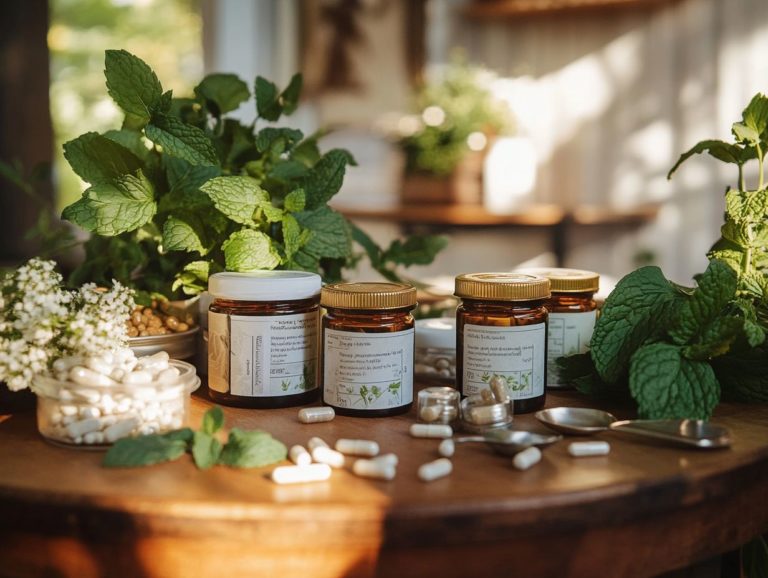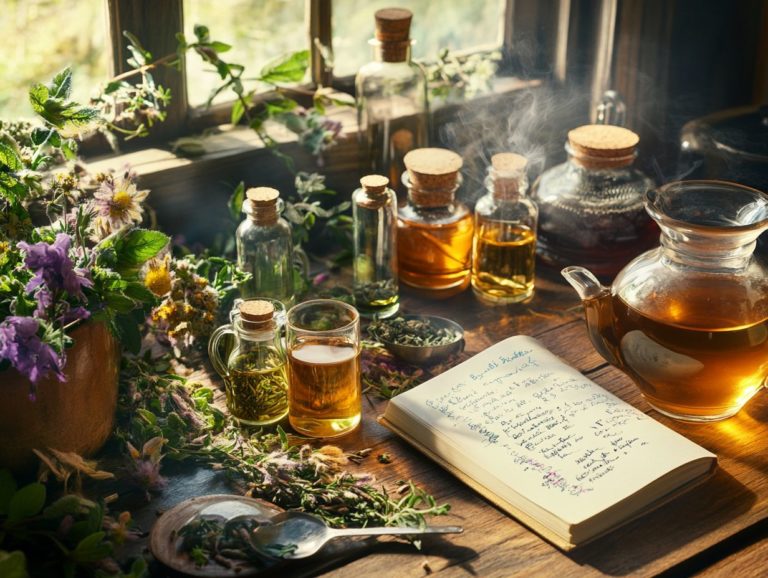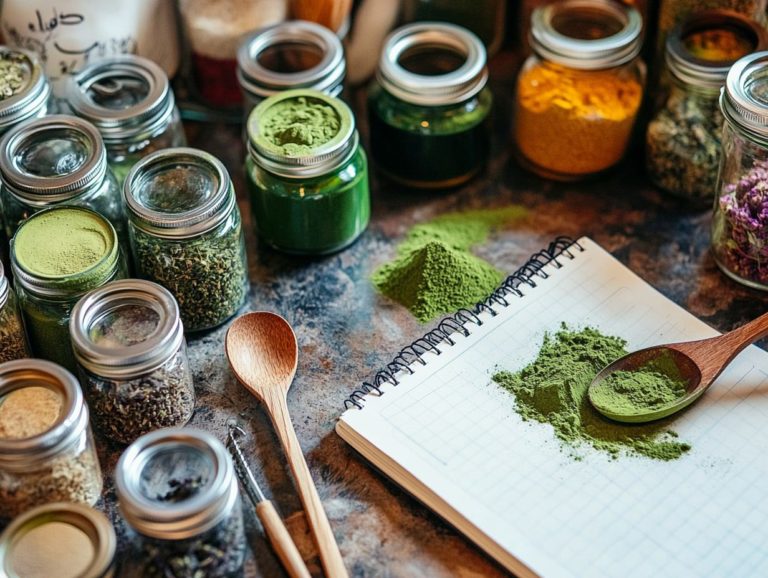Herbal Safety: A Dosage Checklist
Navigating the realm of herbal supplements can evoke a sense of excitement and trepidation. With their rising popularity, understanding how to use them safely is crucial.
This article serves as your essential checklist for herbal safety. It emphasizes crucial considerations like potential interactions with medications, appropriate dosages, and the undeniable importance of consulting healthcare professionals.
Whether you re a seasoned enthusiast or just starting your herbal journey, these insights will empower you to make informed decisions. By following these guidelines, you can unlock the full potential of herbal remedies while minimizing any associated risks!
Contents
- Key Takeaways:
- 1. Check for Potential Interactions with Medications
- 2. Consider the Age and Health Status of the Person Taking the Herb
- 3. Start with Small Doses and Gradually Increase
- 4. Be Aware of Any Allergies or Sensitivities
- 5. Research the Recommended Dosage for the Specific Herb
- 6. Consult with a Healthcare Professional
- 7. Avoid Combining Multiple Herbs with Similar Effects
- 8. Take Note of Any Side Effects
- 9. Be Mindful of the Quality and Source of the Herb
- 10. Follow Instructions on the Label or from a Trusted Source
- 11. Consider the Method of Consumption
- 12. Keep Track of the Duration of Use
- 13. Do Not Exceed Recommended Dosages
- 14. Be Cautious of Herbal Supplements with High Potency
- 15. Listen to Your Body and Adjust Dosage Accordingly
- What Are the Potential Risks of Taking Herbal Supplements?
- Frequently Asked Questions
- What is herbal safety and why is it important?
- What is a dosage checklist for herbal safety?
- Why is it necessary to follow a dosage checklist for herbal remedies?
- Are there different dosage checklists for different herbs?
- Can I alter the recommended dosage on a checklist?
- What should I do if I experience negative side effects from an herbal remedy?
Key Takeaways:
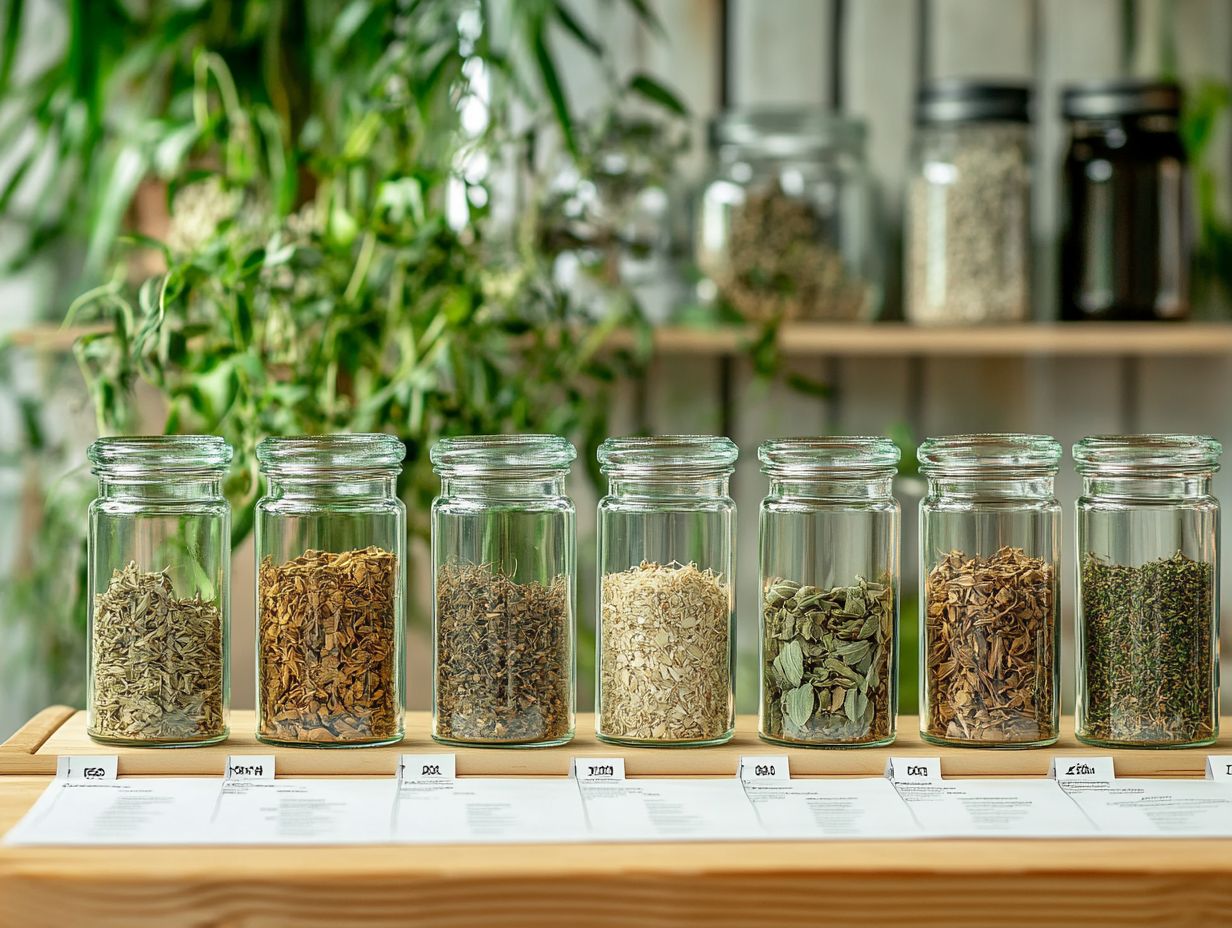
- Always check for interactions to safeguard your health!
- Consider the age and health status of the person taking the herb when determining the dosage.
- Start with small doses and gradually increase to monitor for any side effects.
1. Check for Potential Interactions with Medications
When considering herbal supplements, it s essential to check for potential interactions with your medications. These interactions can lead to negative effects from medicine that may compromise your health.
For example, take Kava. While it s often sought after for its calming effects, it can severely interact with various medications, especially those affecting the liver, potentially increasing the risk of liver damage.
Similarly, St. John’s Wort, celebrated for its antidepressant properties, can reduce the effectiveness of birth control pills, which could lead to unintended pregnancies.
This is where the expertise of herbal practitioners comes into play. They can evaluate the risks tied to these interactions and provide guidance tailored to your needs. By ensuring you understand safety information, you’re not just protecting your health; you’re also optimizing the therapeutic benefits of herbal medicine.
2. Consider the Age and Health Status of the Person Taking the Herb
The age and health status of individuals using herbal remedies are pivotal in assessing the safety and efficacy of these supplements, especially for vulnerable groups such as the elderly or pregnant individuals.
As you age, your body s ability to break down substances may slow down, influencing how you process various herbal products. If you have underlying conditions like diabetes or heart disease, certain herbs could interact negatively with your medications.
Pregnant individuals face similar hurdles; herbs like ginseng and licorice might pose risks to fetal development. Seek personalized assessments from healthcare professionals to ensure both safety and therapeutic effectiveness tailored to your unique needs!
3. Start with Small Doses and Gradually Increase
When embarking on a new herbal supplement regimen, start with small doses and gradually increase them. This approach allows your body to adjust while minimizing the risk of any adverse effects.
Taking this cautious route is crucial, as everyone can react differently to various herbal compounds. Keep an eye out for any side effects during this initial phase to ensure both safety and efficacy.
By paying attention to how your body responds, you can identify potential reactions early. This practice aligns with evidence-based reviews and risk-benefit assessments that highlight the significance of personalized medicine.
By adopting this careful method, you elevate your chances of successful outcomes and cultivate a deeper understanding of how herbal therapies can contribute to your overall wellness, making the most out of plant-based products.
4. Be Aware of Any Allergies or Sensitivities
Awareness of any allergies or sensitivities to herbs is crucial for your safety. Allergic reactions can lead to serious health issues that you want to avoid.
Common allergens like chamomile and echinacea can trigger responses in sensitive individuals. Conduct thorough assessments, including a review of your personal and family medical histories, before trying any new herbal regimen.
Some herbs, like St. John’s Wort and ginseng, may interact with prescription medications. Herbal practitioners can provide tailored advice and ensure a safe and effective approach to your herbal wellness journey.
5. Research the Recommended Dosage for the Specific Herb
Researching the recommended dosage for herbal supplements is essential for ensuring both safety and effectiveness. Using improper dosages can lead to ineffective treatments or even adverse effects.
To navigate the expansive world of herbal information, seek out reliable sources that provide evidence-based reviews. Academic journals, respected health organizations, and well-regarded herbalists are excellent resources since their information undergoes rigorous scientific scrutiny.
Understanding which effective drugs are derived from plants refines your dosage recommendations and enhances your overall therapeutic approach. This knowledge empowers both you and your practitioner, ensuring that herbal remedies work in harmony with traditional treatments, maximizing health benefits while minimizing risks.
6. Consult with a Healthcare Professional
Before starting your herbal journey, talk to a healthcare expert! Consulting with a healthcare professional or a qualified herbal practitioner is essential, especially for individuals considering self-prescribed herbs.
Reach out to naturopaths, herbalists, or integrative health specialists, all of whom have specialized training in botanical medicine. They are instrumental in evaluating your unique health conditions and recommending herbal remedies that fit your specific needs.
By tapping into their expertise, you can minimize risks and steer clear of potential interactions with conventional medications. Specialists guide you on appropriate dosages and monitor your progress, fostering a holistic approach to your care that emphasizes overall well-being and preventive health.
7. Avoid Combining Multiple Herbs with Similar Effects
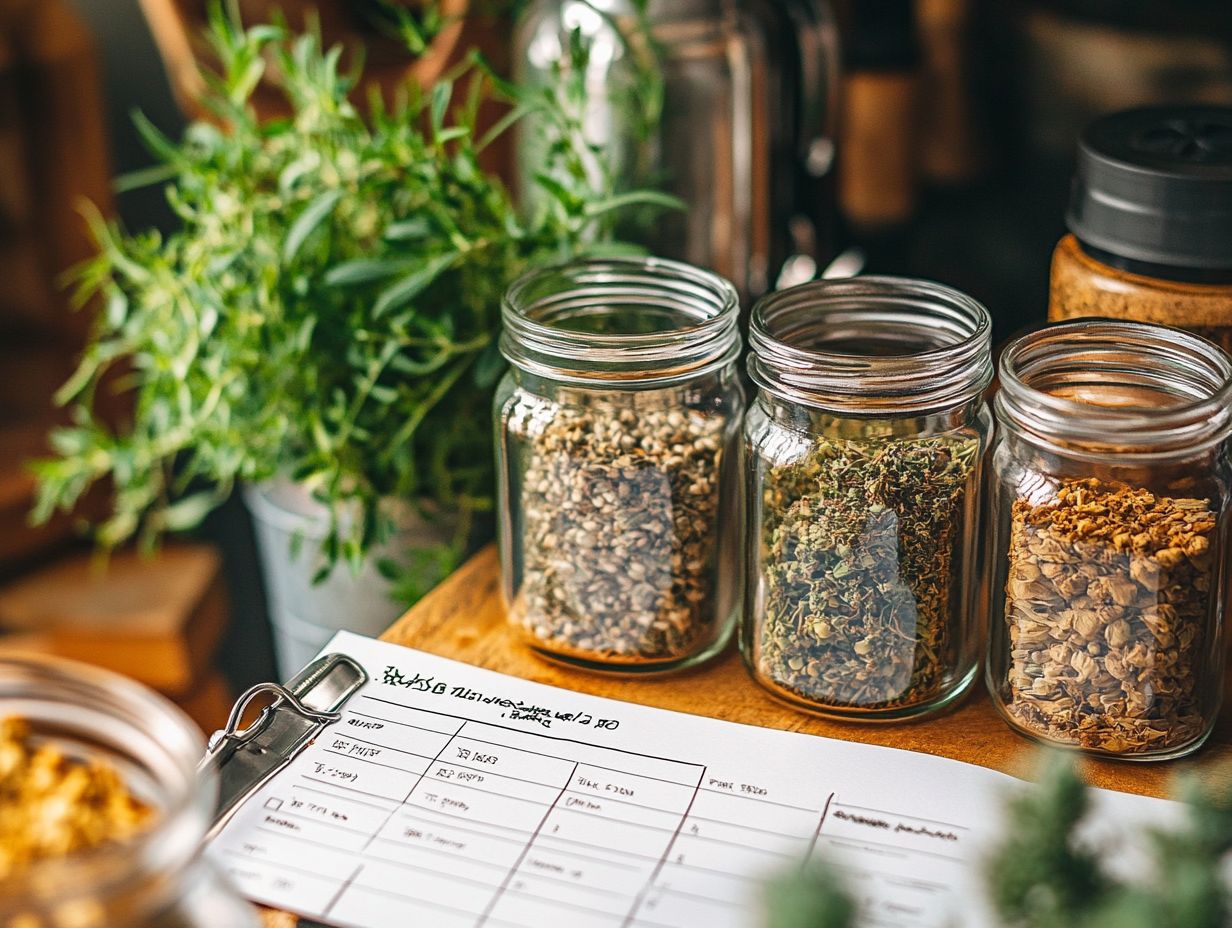
To minimize the risk of potential adverse reactions, avoid combining multiple herbs with similar effects. Doing so can lead to unpredictable interactions and compromise safety.
These interactions might amplify side effects or even negate the intended benefits. Educate yourself about the properties of each herb you consider. The placebo effect, which occurs when you feel better simply because you believe the treatment will work, rather than due to its actual effects, adds another layer of complexity.
By understanding these dynamics, you can sharpen your assessments of herbal efficacy and foster safer practices, ultimately prioritizing your well-being.
8. Take Note of Any Side Effects
Note any side effects while using herbal remedies. This is crucial for managing your safety and monitoring any negative effects.
Documenting your experiences helps deepen the understanding of these natural treatments. Your insights can help identify potential reactions and foster accountability among practitioners.
Share your reports! This collaboration leads to safer usage guidelines and can refine existing herbal protocols.
9. Be Mindful of the Quality and Source of the Herb
Check the quality and source of herbal products. Low-quality herbs can cause ineffective treatments and harmful effects.
In a market full of supplements, it s hard to spot high-quality products. Quality control protects your health and builds trust in the industry.
Choose herbs from reputable suppliers. This ensures that what you consume is effective and safe.
10. Follow Instructions on the Label or from a Trusted Source
Always follow the instructions on the label or from a trusted source. This practice protects you from misuse and ensures the correct dosage.
Ignoring these guidelines can lead to unintended effects or poor results. Use these remedies to maximize benefits while minimizing risks.
Consult reputable herbalists or scientific studies for accurate information. They help you make informed decisions.
With these resources, navigate the world of herbal supplements with confidence.
11. Consider the Method of Consumption
Think about how you consume herbal products. Different forms affect absorption rates and effectiveness.
For instance, teas deliver benefits quickly, while capsules offer controlled release for lasting effects. Tinctures are potent but require careful attention to dosage.
Each method has unique advantages, so choose what best fits your health needs.
12. Keep Track of the Duration of Use
Monitor how long you use herbal remedies. This helps evaluate safety and ensures you don’t exceed the recommended duration.
Regular assessments offer insights into whether continued use is beneficial. Monitor your physical reactions and any symptoms that change over time.
Reviewing the effectiveness of your treatments helps avoid unnecessary risks and make informed health choices.
13. Do Not Exceed Recommended Dosages
Stick to recommended dosages in your herbal practice for safety.
Taking too much can cause health issues, ranging from mild side effects like digestive discomfort to severe reactions that might need medical intervention. You should always be aware of these risks and actively monitor your intake.
Keep a log of the supplements you take. Set reminders for dosage times and consult healthcare professionals. This helps you follow dosage guidelines.
Understanding that the effectiveness of herbal treatments depends on precise dosages helps you get the best results safely while minimizing potential hazards associated with misuse.
14. Be Cautious of Herbal Supplements with High Potency
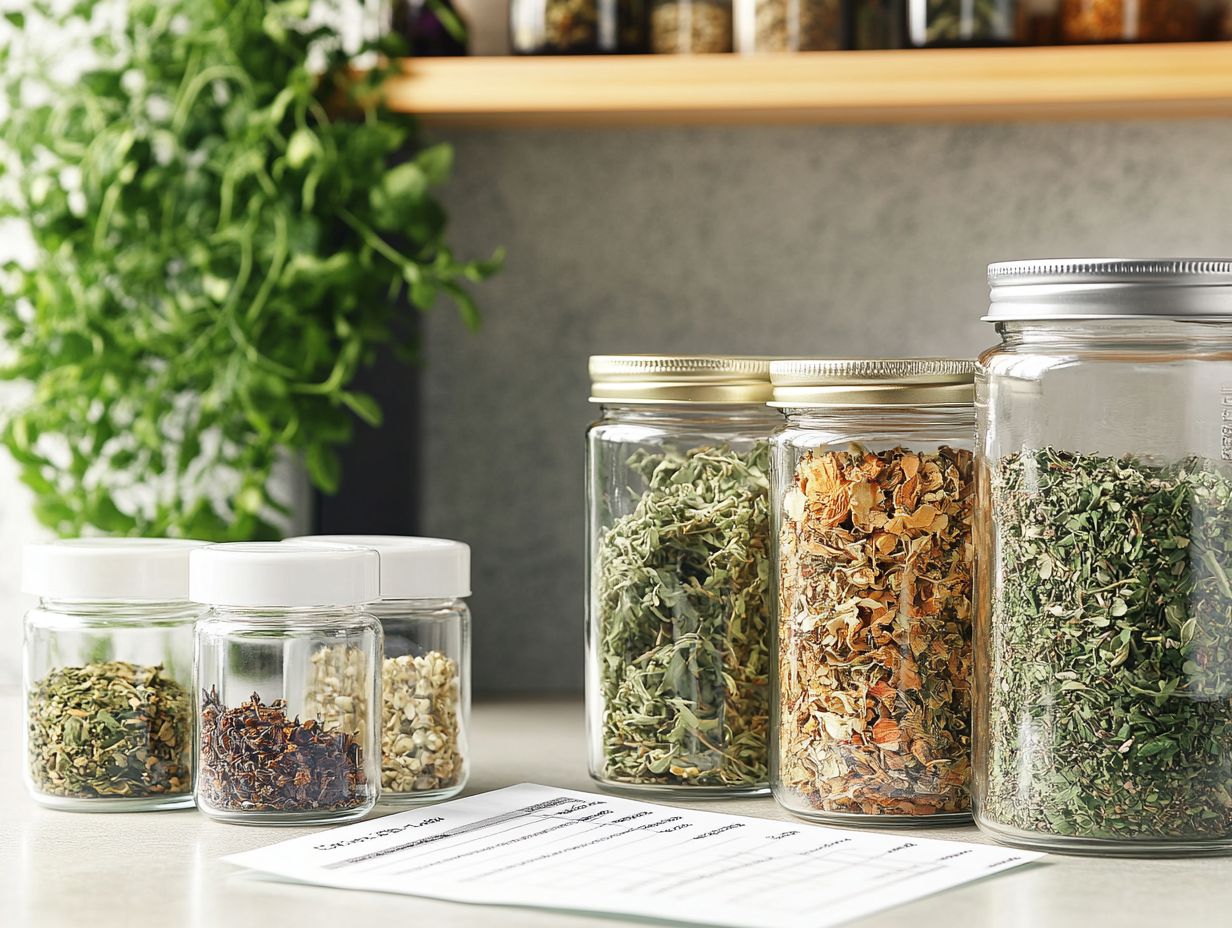
Be careful with high-potency herbal supplements. They can raise the risk of adverse effects and complicate assessments of herbal safety.
Knowing about potency is important for your safety and the effectiveness of these remedies. The strength of a supplement can change how it works. For example, well-known supplements like black cohosh and St. John’s Wort, celebrated for their high potency, may interact negatively with prescription medications or trigger unexpected side effects in sensitive individuals.
Consult with healthcare providers before adding such potent herbs to your regimen. Adhering to dosage guidelines and closely monitoring your body’s reactions ensures safe and effective use. For more information, consider creating herbal remedies: safety tips to enjoy the potential benefits without compromising your health.
15. Listen to Your Body and Adjust Dosage Accordingly
Listen to your body and adjust your dosage for safe herbal use. This ensures your treatment aligns with your unique responses and minimizes any adverse reactions.
Pay careful attention to how you feel before and after taking herbal remedies. This helps you notice subtle signals that may indicate whether you need to increase, decrease, or maintain your dosage.
Having a solid foundation of herbal knowledge enables you to make informed decisions. Understanding the properties and potential side effects of different herbs can enhance the effectiveness of your treatment while ensuring your safety. The combination of self-awareness and education leads to a more personalized and effective approach to herbal practices.
What Are the Potential Risks of Taking Herbal Supplements?
Herbal supplements can have risks, including adverse effects and interactions with other medications. Understand herbal safety completely.
Don t assume that ‘natural’ means safe. Some herbal remedies may trigger allergic reactions, cause gastrointestinal disturbances, or even result in more severe issues when combined with prescription medications.
These supplements aren t always proven to work. By consulting healthcare professionals and staying informed about potential interactions, you can make educated decisions about your health. This helps you safely add herbal options to your wellness plan.
How Can One Determine the Correct Dosage for Herbal Supplements?
To determine the right dosage of herbal supplements, consider the type of herb, your health conditions, and your health goals.
Consult authoritative herbal references for recommended dosages based on traditional uses and scientific research. Engaging with healthcare professionals who specialize in herbal medicine can be invaluable.
These experts can tailor their recommendations to your health profile and help you navigate potential interactions with other medications.
By adhering to evidence-based guidelines, you enhance the efficacy of these supplements and ensure your safety, minimizing the risk of adverse effects.
Therefore, adopting a collaborative approach that blends knowledge from reputable literature with expert opinions is vital for anyone seeking the benefits of herbal remedies.
What Are the Common Mistakes When Taking Herbal Supplements?
Avoid common mistakes when taking herbal supplements. These can lead to safety concerns and impact your health outcomes.
Many users remain unaware of the potential adverse effects from oversights. Issues often arise from a lack of understanding about the ingredients and their interactions.
It s easy to fall for unverified claims, mistakenly believing that all natural alternatives are inherently safe. Prioritize researching the specific supplements you re considering.
This enables you to discern credible sources of information. Engaging with herbal experts or healthcare professionals can enhance your knowledge.
Informed decisions protect your health while maximizing the benefits of these natural products.
How Can One Ensure the Safety and Efficacy of Herbal Supplements?
Ensuring the safety and efficacy of herbal supplements requires thorough research and monitoring the safety of medicines.
Actively seek the counsel of healthcare professionals who specialize in herbal remedies. Their expertise helps you navigate potential interactions with conventional medications.
Engaging in discussions with experts ensures your decisions are grounded in the latest evidence-based reviews. Stay updated with ongoing research; it illuminates the evolving landscape of herbal safety.
This collective approach encourages informed and responsible use of herbal products, ultimately prioritizing your health and wellness.
What Are the Different Forms of Herbal Supplements and How Do They Affect Dosage?
Different forms of herbal supplements like teas, capsules, and tinctures greatly influence both dosage and efficacy.
Teas provide a gentle introduction to herbal benefits, but often require larger quantities to achieve the same potency found in concentrated capsules or tinctures.
Capsules offer precise dosages, perfect for those who prefer a straightforward approach without the complexities of taste that come with infusions.
Tinctures are highly concentrated extracts that typically require smaller doses. Keep in mind that their absorption rates can vary based on your metabolism.
This variability underscores the importance of choosing the right form that suits your health needs. Consider factors like safety and potential interactions, including the safe dosage for adults and children, as well as specific therapeutic goals to maximize the benefits of herbal supplementation.
Frequently Asked Questions
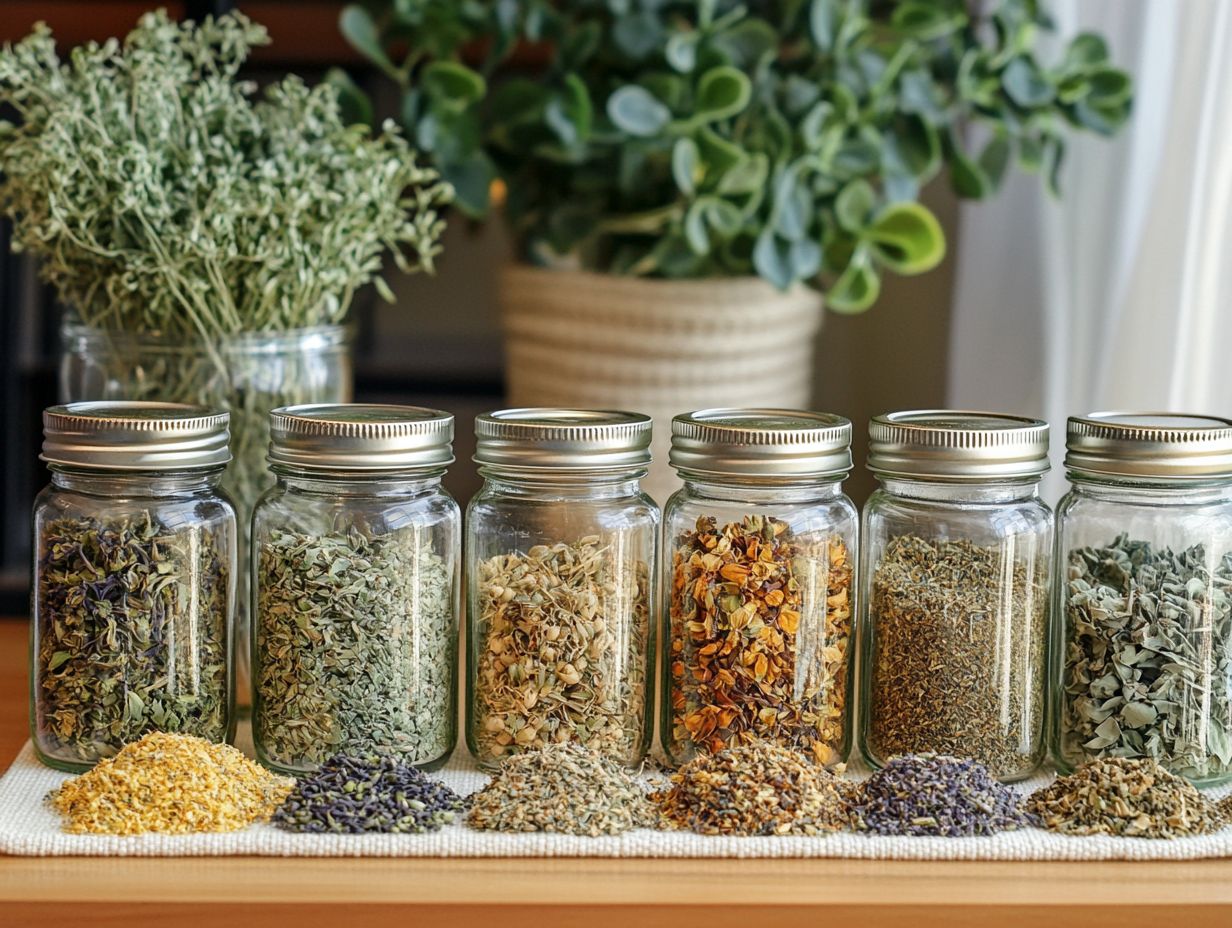
What is herbal safety and why is it important?
Herbal safety refers to the proper use of herbal remedies for health and wellness. It is crucial to ensure safety when using herbs to avoid potential side effects or interactions with other medications.
What is a dosage checklist for herbal safety?
A dosage checklist lists the recommended doses for herbal remedies. It details the right amount and how often to use each herb for safety and effectiveness.
Why is it necessary to follow a dosage checklist for herbal remedies?
Following a dosage checklist helps avoid risks and side effects from incorrect dosing. It ensures the remedy works as intended.
Are there different dosage checklists for different herbs?
Yes, each herb has its unique dosage checklist based on its type and potency. Always check a trustworthy source for the correct dosage for each herb.
Can I alter the recommended dosage on a checklist?
No, do not change the recommended dosage without consulting a healthcare professional. Doing so may affect safety and effectiveness.
What should I do if I experience negative side effects from an herbal remedy?
If you have negative side effects, stop using the remedy right away and consult a healthcare provider. Keep a record of any reactions and inform them about all herbal remedies you re taking.

